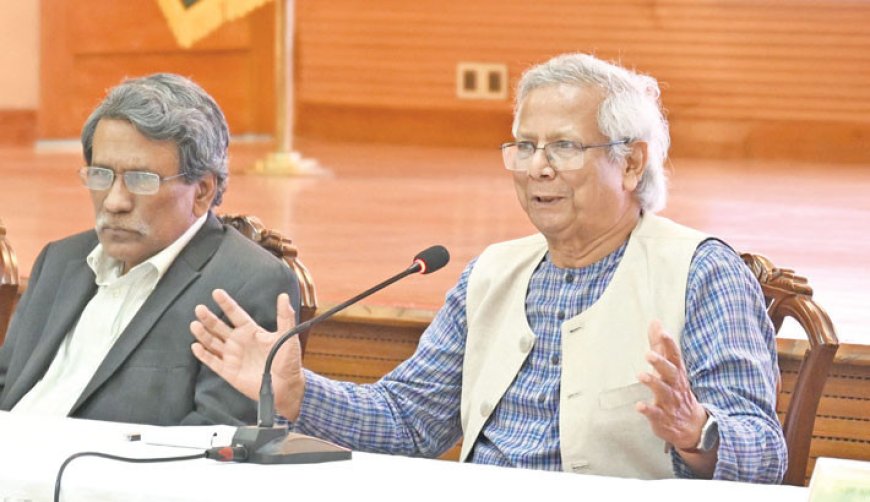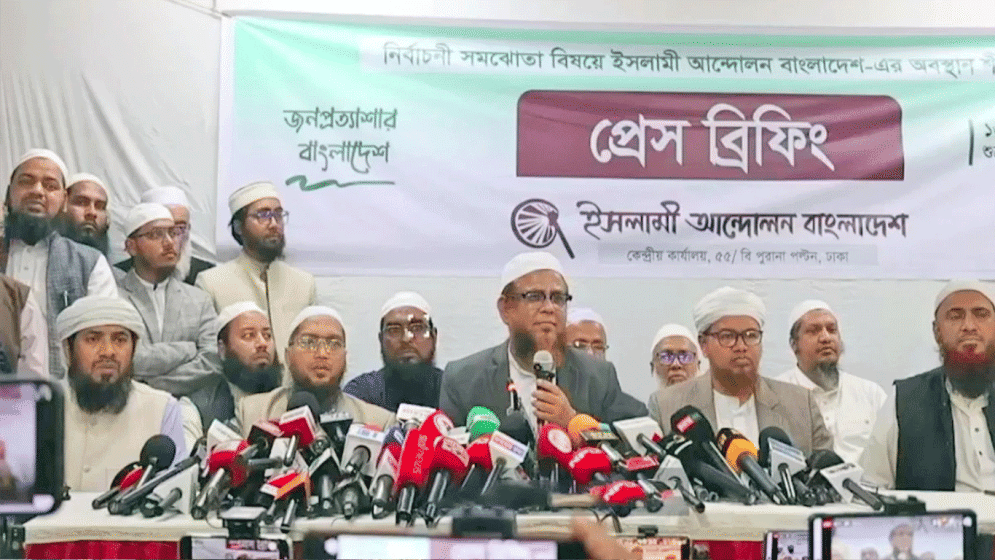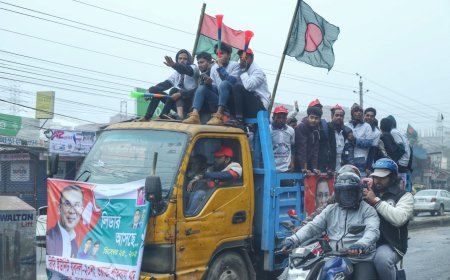Parties to sign July Charter as Yunus reiterates commitment to February elections
Chief Adviser says the July Charter signing will be a moment of national celebration, despite last-minute uncertainty over its terms

Prof Yunus Reaffirms February Polls as Parties Prepare to Sign July National Charter 2025
Chief Adviser Professor Muhammad Yunus on Wednesday reiterated that Bangladesh’s next parliamentary election will be held in February in a “festive mood,” as political parties gear up to sign the long-awaited July National Charter 2025 tomorrow, despite lingering uncertainties.
Addressing a meeting of the National Consensus Commission (NCC) with political party representatives at the Foreign Service Academy in Dhaka, Prof Yunus described the election and the July Charter as “interrelated,” emphasizing that both must progress together.
“We have repeatedly stated that elections must be held in February – and they will be conducted in a festive spirit,” he said. “We will do everything possible to ensure the election is celebratory. There will be no compromise on this.”
The chief adviser expressed optimism that the signing of the July Charter, scheduled for Friday at the South Plaza of the National Parliament Complex, would be “an occasion of celebration for the entire nation.”
“What seemed impossible has become possible thanks to your support,” he added. “We will join the ceremony in a festive mood and sign the Charter. This is our hope, and we aim to share it with the whole nation.”
Prof Yunus, who also chairs the NCC, thanked political leaders and commission members for their cooperation, calling it “the conclusion of a significant chapter as a new one begins.”
Last-Minute Uncertainty Over Charter Implementation
Despite near-complete preparations, both the interim government and the NCC face last-minute uncertainty regarding aspects of the Charter’s implementation. To address these concerns, Prof Yunus convened an emergency meeting on Wednesday evening with leaders of 33 political parties and alliances that had participated in earlier reform talks.
Represented parties included the Bangladesh Nationalist Party (BNP), Bangladesh Jamaat-e-Islami, National Citizen Party (NCP), Islami Andolan Bangladesh (IAB), AB Party, Liberal Democratic Party (LDP), Jatiya Samajtantrik Dal (JSD), Communist Party of Bangladesh (CPB), Islami Oikya Jote, Khelafat Majlis, Nagorik Oikya, Nationalist Democratic Movement (NDM), Gono Odhikar Parishad, Gono Forum, Gana Samhati Andolan, Bangladesh Nezame Islam Party, the 12-party alliance, Left Democratic Alliance, Bangladesher Samajtantrik Dal (BASOD) and BASOD (Marxist).
On Tuesday night, the NCC circulated the final draft of the Charter. However, several left-leaning parties, including CPB, JSD, BASOD, and BASOD (Marxist), announced they would not sign, citing the Charter’s lack of historical reflection on the Liberation War and independence. Gono Forum also indicated it might abstain unless revisions were made.
“If the July Charter is not amended by Thursday, we will not sign it,” Gono Forum leader Mizanur Rahman told reporters. BASOD General Secretary Bazlur Rashid Firoz added that his party would not sign because “the history of the Liberation War and independence was not reflected in the background of the Charter.”
The remaining uncertainty largely stems from differences among parties over how the Charter will be implemented, with specific recommendations yet to be finalized.
Parties Pledge to Sign With Notes of Dissent
Despite disagreements, most parties indicated readiness to sign the Charter on Friday.
BNP Standing Committee member Salahuddin Ahmed said the nation desired reform and that the BNP shared that aspiration. “We will all sign the July Charter,” he said, noting that issues of disagreement would be documented as notes of dissent in the relevant clauses.
Jamaat-e-Islami Naib-e-Ameer Dr. Syed Abdullah Mohammad Taher said his party expected to attend the signing ceremony, despite insisting on a referendum before the elections. NCP Member Secretary Akhter Hossain stressed the importance of clarity in implementation: “Our main goal is to clear the path for implementing the July Charter. If the Charter is signed after everything is clear, that will be our success.”
Referendum Timing Divides Parties
While all parties participating in the reform talks agreed on holding a referendum to implement the Charter, they remain split on its timing. BNP and several allies favor holding the referendum alongside the national elections, while Jamaat-e-Islami and others insist it should take place beforehand. Despite these differences, both sides have agreed to sign the Charter on Friday.
Law Adviser Dr. Asif Nazrul expressed confidence in the process. “All political parties participated sincerely in discussions on the July Charter and are expected to sign in the same spirit. I believe that all political parties will sign the July Charter,” he said.
NCC Vice-Chairman Prof. Ali Riaz, National Security Adviser Dr. Khalilur Rahman, and Principal Secretary to the Chief Adviser M. Siraz Uddin Miah were also present at the meeting.
Summing up the spirit of consensus, Prof Yunus said the Charter would be remembered as “a remarkable achievement in the global political system,” adding: “Political leaders not only discussed issues but also found solutions. The July Charter will become a major asset for the nation.”
What's Your Reaction?





















































































